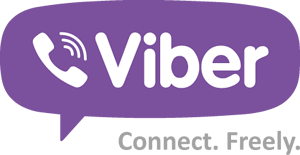What Is Viber’s Start Up Story? How Talmon Marco and Igor Magazinik Founded The Company
What Is Viber?
Viber is a mobile messenger that makes it possible for you to chat, call, and send files to all other users of the app, using your Internet connection. It was created by a company called Viber Media (viber.com) and today is one of the most popular applications offering a free voice-over IP (VoIP) service to its users. This term may be familiar to you as Skype and RingCentral offer a similar service… However, Viber is a bit different. It is specifically created and marketed for mobile platforms and made to be extremely user-friendly and easy to use. The account creation is straightforward and rather than manually adding friends by their contact information – like Skype does – it automatically scans the user’s phone address book to find contacts with Viber accounts. Thus, after installing the app and configuring your account, you’re already connected to anyone with a Viber account in your contacts… This makes connecting with friends extremely straightforward and virtually effortless.
Using Viber, individuals can make calls and send texts over 3G, 4G, 5G, and any other mobile and wi-fi networks. It’s so optimized for this purpose, that in most cases there is no need for a faster wireless connection! The app gives users the freedom to go about their day and send texts or make calls as needed regardless of their location, making use of the app feel very natural. Probably ease of use is one of the best competitive advantages of the mobile app. Viber is offered on multiple platforms as well: IOS users can send messages to Blackberry users who can send messages to Android users. There are over 650 million users registered today from all over the world. This number hasn’t stopped growing as the company has been constantly improving its application. The story behind this astonishing app is really amazing, and in the rest of this article, I will share with you how exactly the company was started.
How The Idea Behind Viber Was Born And How The Company Was Founded

Talmon Marco, one of the founders of Viber – a pic from his LinkedIn profile: https://www.linkedin.com/in/talmonmarco
The company was founded on the 2nd of December 2010, by Talmon Marco, Igor Magazinik, Ofer Samocha, and Sani Maroli, with Marco being the CEO. Here is an interesting fact about how the idea behind the company was born… And the main cause that led to starting Viber was … love… Mаrco lived in New York and had a girlfriend (currently his wife) in Hong Kong. As most innocent souls captured in the love trap, they were spending a lot of time talking to each other on the phone. The big distance between them was only ballooning their telephone bills more and this was how Marco started looking for the best way to stay in touch with his honey by mobile phone… This was how the Viber story began.
Viber was developed as a competitive alternative to other services available such as WhatsApp, Wechat, and Skype. Actually, when it was started, there was serious competition out there… But according to Marco, this only helped him to become better and succeed faster. Once he said: “I think competition drives innovation. I doubt we would be where we are today, from a feature set standpoint, if it weren’t for our competition.” My thought on that is that he was absolutely right… Competition is very often mentioned to be the main driving force for achieving success by many start-up founders.
Before becoming an entrepreneur, Marco had worked as Chief Information Officer for the Israeli Defense Forces in the 1990s. He was born in Israel but was raised in the US. After his army job, he and his friend Igor Magazinik started iMesh, a P2P file-sharing service. The project was successful and it played a crucial role because Viber was actually started with the money generated from iMesh.
Although all of the developers are of Israeli nationality, Viber’s headquarters are located in Limassol, Cyprus, and have other offices located in Belarus, China, and Israel. Unlike many startups, Viber did not receive any venture capital money. The lean start-up funded itself by way of family and friends, as well as profits from Marco’s other program, iMesh. This was crucial to its success because for the first two years the program was available, it did not generate any revenue. A venture like this would have been hardly financed by a fund, or at least the terms of financing wouldn’t have been very optimal for the founders. However, during these two years, a lot was invested in the app and it was established as one of the top mobile messengers on the market. It was time for this huge investment to start bringing some return. Viber was totally free (and still is), and nobody paid anything for using it. The founders didn’t want to change this, so they started thinking of some other ways of monetizing it. This was achieved by developing some paid services in addition, such as Viber Out and their graphical “Sticker store”, Viber began to make great profits. On 13th February 2014, Japanese electronic commerce and internet service Rakuten purchased the company for USD$900 million. They have since merged their 200 million users with Viber’s clientele base.
Early Development of Viber
The early development of Viber offered a very promising glimpse into its future. From its birth, the company had a long line of beta users ready to trial the software. The initial IOS version was graciously received with 350 million unique registered downloads. Six months later, Viber pre-released a version of its software for the Android marketplace that was limited to 50,000 users. A full version was released a little after a year later. On 8th May 2012, a version for Blackberry and Windows phones were released, prompting another large surge in downloads and overall membership. On 24th July 2012, Viber announced a huge milestone: with 90 million users, it would be releasing the availability of group messaging as well as a high-definition voice calling feature. A year later, Viber was personally attacked by the Syrian Electronic Army. The company’s support system had been defaced, but according to executives, no sensitive information had been revealed. On the same note, Marco has been quoted saying he is the only one with access to the encryption key and he has never revealed it to anyone, despite certain groups’ pressure to do so.
A company with such great success has many interesting facts about it. Rakuten acquired the company because it believed it was progressing at such a fast rate, it may not have been able to do so in the future. In the acquisition, the founders of Viber made almost 30 times their initial investments. Despite their great overall success, problems were not absent, too. Viber’s initial versions had many security issues. Marco is quoted saying people should be concerned about their privacy. More than 50 percent of their users live in Middle Eastern countries where services such as WhatsApp and Viber are banned. After successfully dealing with security issues and creating safe end-to-end encryption, Viber has had greater success than in the past. Recently, Viber has been developing its new service called Viber Out which allows its users to call cell phones and landlines and it’s one of the main revenue sources of the company. This service was initially offered to Typhoon Haiyan victims so they could connect with their loved ones, but eventually became offered to any user. It charges per minute based on location, so rates will vary. Users can link a credit card to their account so they do not have to manually reload their credit.
Viber Today
Today, Viber is still one of the most popular and delightful messenger apps out there, especially in Europe, Brasil, Russia, and some other countries… According to some stats in 2020, it was installed on 97% of all Ukrainian phones. I’m a happy user of it, too. It’s gone through a long way since the company was started, and has evolved a lot to become more convenient to use, more secure, and to become one of the best communication apps out there as a whole.
The app is one of the most comprehensive messaging-based platforms on the market, allowing users to do much more than simply text each other. Viber is an instant messaging app that allows users to interact with each other through voice and video calls, text messages, as well as sending photos and videos.
The primary benefit of using Viber is that it is highly convenient to use and is available as an app on iOS, Android, and Windows phones. Viber is also available on desktop computers and laptops, making it a convenient method of communication for both online and offline users.
Viber offers some unique features that are sure to make any communication more convenient. This includes the ability to share locations with those on the app, make free voice calls, send voice messages, and use the app to create bots that can automate tasks. Viber is also compatible with VoIP services, allowing users to make free calls over an internet connection.
Overall, Viber is a great tool for communicating with family and friends, both near and far. Its features make it a great option for both professional and casual use, and its wide range of applications makes it an attractive choice for many users. Have you ever used Viber before? What do you think of the platform?
This was the great startup story of a great company. If you liked it, please, use our social sharing buttons and share it with friends. This way you will help us publish more cool stories like this. Thanks!








